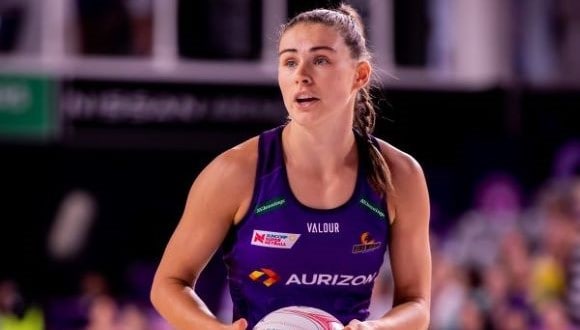How Super Netball star Macy Gardner manages her painful periods
Published May 2023 | 4 min read
Words by Lucy E Cousins
After dealing with severe period pain for most of her life, this Aussie athlete says education and being open about menstruation is key.
For 23-year-old Queensland Firebirds and Super Netball player Macy Gardner, netball has been part of her life since she was born. Her mother, acclaimed goalkeeper and international netball coach Roselee Jencke, has 43 Test appearances, over 15 years’ coaching experience and an Order of Australia under her belt.
So, no pressure, then?
“I've loved netball from the moment I got my hands on a netball,” says Macy. “I was always taken along to the netball courts while my mum was playing and, as I wasn’t a very patient child, I would always want to get involved and jump in.”
By the time she was six, she was participating in NetSetGO (netball's official starter program for kids aged five to 10), building up her skills and getting used to being in a team. Unsurprisingly, considering her lineage, she excelled at it.
Later in high school, Macy represented Queensland in the under-17s and under-19s, and became a training partner for the Firebirds in 2019. Now, she’s a full-time player for the team, while also studying a Bachelor of Business part time.

The support of the team
Though she tried other sports in the past, it’s always been the team dynamic of netball that Macy gravitated towards, especially with the Firebirds, which she says is a supportive community.
“At the Firebirds, it's such a safe place. Everyone talks about everything!” she says. One area that the team is particularly open about is periods, also known as menstruation, and it’s a subject that Macy is passionate about sharing.
“We're all on very different paths [in the team] in terms of our periods,” she says. “It’s really important to talk about it because you can listen to each other's stories and see what's similar and what's not, and share ideas on how to cope.”
For Macy, “excruciatingly” painful periods, including severe stomach cramps, light-headedness, fatigue and going through up to two tampons an hour, have always been a part of her life.
“I remember the shivers of fear I’d get every time I’d stand up at school and ask someone to check my skirt to see if it'd leaked through,” she recalls.
How Macy eases her period pain
According to research, the period pain and heavy bleeding that Macy experiences is fairly common. Around one in five women suffer from heavy menstrual bleeding (also known as menorrhagia), and 77% say that period pain has affected their ability to work.
“I’ve had to learn to accommodate my symptoms and not just ‘push’ through them,” she says. “Now, I take that extra rest and try to be really in tune with my body and myself to know not to exert myself too hard.”
For Macy, it’s about “doing what feels good” during her period and the rest of her month so her body is being nurtured.
“I aim for eight hours’ sleep and try to cut down on social media, plus I love to eat fresh food, like fruit and vegies. And also snacks!” she says. “I try not to be restrictive at all.”

Macy with fellow Firebird Kim Ravaillion.
Getting help for painful periods
Macy’s relationship with her mum has always been open and she was able to talk about her period pain with her freely throughout her childhood. That’s been incredibly helpful for her, yet she admits many women don’t grow up with that luxury.
“It's just really important that at a younger age we're talking about our periods to someone supportive. If you don’t have that, it can be a very lonely situation to be in,” she says. “We need to advocate to allow young teenage girls and those beginning their periods to have resources and people they can go to if they need support.”
This is especially important, with research suggesting around 50% of Aussies under 25 don’t talk to their GP or seek medical help for painful periods.
“Not everyone is going to feel super confident speaking about [their period] with others, so it’s just about knowing that you can use online resources as well, instead of having to always talk about it,” adds Macy.
And her advice for anyone experiencing painful periods?
“Know that you’re not the only one going through it,” she says. “We all have access to the internet so readily at our fingertips, so look up information online from trusted sources that can assist in navigating painful periods or check in with your GP. You don't have to suffer. It's okay to get help if you need it.”
Resources for periods and painful periods
Jean Hailes for Women’s Health: Online information and free downloadable booklets, symptom diaries and fact sheets.
Planet Puberty: Resources and workshops to help parents of kids with intellectual disability and autism navigate menstruation.
HCF Women’s Health Hub: Real-life stories, and the latest information on endometriosis and pelvic pain symptoms diagnosis and treatments.
See your GP: Speak to your GP about heavy or painful periods. Our partnership with GP2U, an online video GP service, makes it easier for eligible members to access telehealth services. All HCF members with health cover can access a standard GP consultation (up to 10 minutes) for a fee of $50. See hcf.com.au/gp2u for more information.
RELATED ARTICLES
BENEFITS OF NETBALL
The health benefits include fitness and bone strength, but the social and wellbeing benefits are also significant.
BENEFITS OF TEAM SPORTS
From helping you beat loneliness to scoring goals at work, being part of a sporty squad can be a winning move.